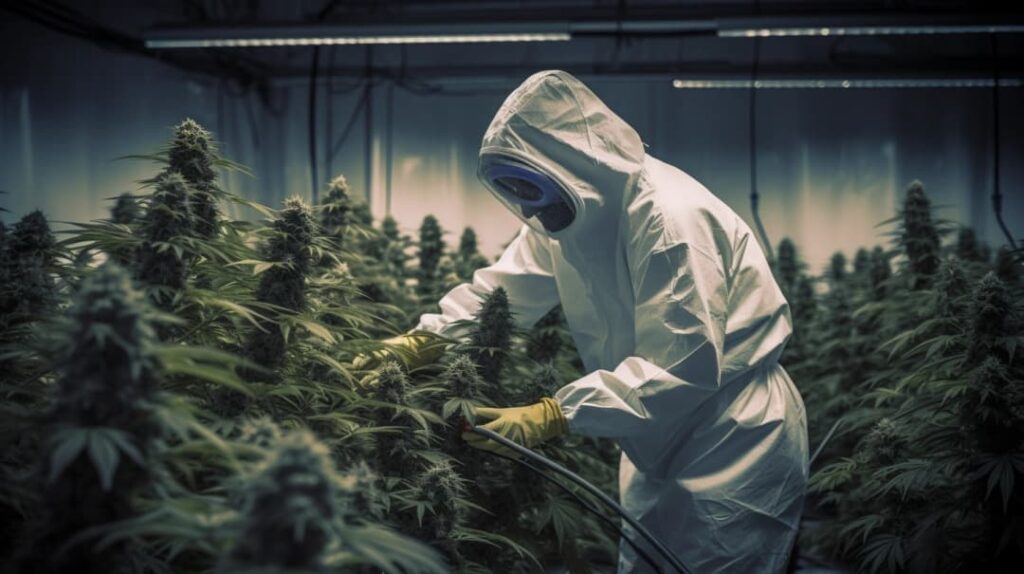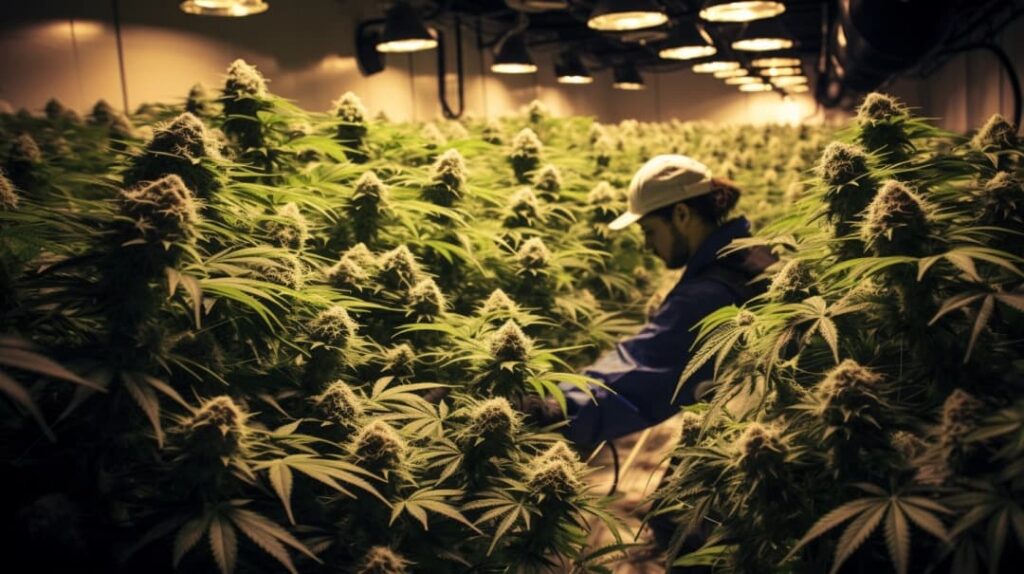Explore the intricacies of safeguarding against agricultural pests, navigating environmental factors that influence cultivation. This blog dissects the pivotal role of soil requirements in deterring pests and highlights long-term prevention techniques employed by dispensaries. Delve into the nuanced science behind the prevention of pests, understanding how dispensaries harmonize environmental factors with vigilant cultivation practices.
From pest-resistant strains to eco-friendly measures, discover how Denver dispensaries navigate the dynamic landscape of pest management. Whether you’re a cultivator or a consumer, understanding the robust strategies in place enhances your appreciation for the commitment to quality and sustainability within Denver’s cannabis culture. It’s time to delve into the world of pest management, where dispensaries showcase their expertise in fostering a pest-free environment for premium cannabis cultivation.
Common Pests in Cannabis Cultivation
If you’re a cannabis cultivator, you may encounter common pests in your cultivation process. Pest prevention and pest identification are crucial aspects of maintaining a healthy and thriving cannabis crop. To prevent pests from infesting your plants, it’s important to implement proper pest prevention strategies. Regularly inspect your plants for any signs of pests, such as chewed leaves, yellowing, or wilting. By identifying pests early on, you can take immediate action to eliminate them and prevent further damage.
Additionally, it’s essential to keep your cultivation area clean and free from debris, as this can attract pests. Implementing organic pest control methods, such as using beneficial insects or natural repellents, can also help in preventing the infestation of common pests in your cannabis cultivation. Remember, proactive pest prevention is key to safeguarding your cannabis plants and ensuring a successful harvest.

Early Detection and Prevention Strategies
When it comes to pest management in your cannabis cultivation, early detection and prevention strategies are crucial. By learning how to identify common pests that can infest your plants, you can take immediate action to mitigate their impact. Implementing natural pest control methods and regularly inspecting your plants will help ensure the health and vitality of your crop.
Identifying Common Pests
To effectively manage pests in your Denver dispensary’s cultivation, it is essential to be proactive in identifying common pests and implementing early detection and prevention strategies. Pest identification methods are crucial for successful pest management in indoor cultivation. Regularly inspect your plants for signs of pest infestation, such as damaged leaves, discoloration, or visible insects. Use magnifying glasses or microscopes to closely examine plants and identify any pests that may be present.
Additionally, monitoring traps can help you track the presence and population of pests in your cultivation area. Once you have identified the pests, take immediate action to prevent their spread. This may include removing and destroying infested plants, using organic or chemical pesticides, or introducing beneficial insects that prey on pests. By being vigilant and proactive, you can effectively control and prevent pests in your Denver dispensary’s cultivation.
Natural Pest Control Methods
To effectively manage pests in your Denver dispensary’s cultivation, it is essential to be proactive in identifying common pests and implementing early detection and prevention strategies. Natural pest control methods can be a great way to address pest issues without the use of harmful chemicals. One effective approach is to use natural pest repellents. These can include plants like lavender, peppermint, and marigold, which naturally repel pests such as aphids, mosquitoes, and spiders.
Another option is to create homemade insecticides using ingredients like garlic, neem oil, and dish soap. These homemade solutions can be sprayed directly onto affected plants to deter pests. By incorporating natural pest repellents and homemade insecticides into your pest management routine, you can take a proactive approach to prevent and control pests in your Denver dispensary’s cultivation.
Importance of Regular Inspections
To effectively manage pests in your Denver dispensary’s cultivation, it is crucial that you regularly inspect your plants for signs of infestation or damage. Regular inspections serve as early detection and prevention strategies, allowing you to identify and address pest problems before they become severe. By conducting regular inspections, you can monitor the health of your plants and take immediate action if any signs of pests or damage are observed.
This proactive approach helps you maintain a healthy and thriving cultivation environment, preventing the spread of pests and minimizing potential crop losses. Additionally, regular inspections allow you to assess the effectiveness of your pest management strategies and make necessary adjustments to ensure long-term success. Make it a priority to schedule regular inspections to keep your Denver dispensary’s cultivation free from pests and to ensure the health and quality of your plants.
Organic Pest Control Methods
You should regularly use organic pest control methods to ensure the health and safety of your cannabis plants. There are several benefits of using organic pest control methods. Firstly, they are safer for the environment as they do not contain harmful chemicals that can contaminate the soil or water. Additionally, organic pest control methods do not pose a risk to human health, making them ideal for cannabis cultivation. DIY pest control methods are also cost-effective, as they can be made from household items or easily sourced ingredients. Examples of DIY pest control methods include using neem oil, garlic spray, or soap and water solutions. By implementing these organic pest control methods, you can protect your cannabis plants from pests without compromising their quality or your health.

Integrated Pest Management Techniques
Now, let’s explore the effective techniques of integrated pest management. This approach combines biological pest control methods with chemical-free pest management strategies. By utilizing natural predators and implementing preventive measures, you can maintain a healthy and pest-free cultivation environment in your Denver dispensary.
Biological Pest Control
How effectively can biological pest control techniques be integrated into your Denver dispensary’s cultivation practices? Incorporating biological pest control methods can offer numerous benefits and enhance the effectiveness of pest management in your cultivation practices. Here are four reasons why you should consider implementing biological control:
- Environmentally friendly: Biological control methods primarily utilize natural predators and parasites, minimizing the use of harmful chemicals and reducing environmental impact.
- Targeted approach: Biological control focuses on specific pests, ensuring that beneficial organisms only harm the intended targets, leaving other organisms unharmed.
- Long-term solution: Biological control methods establish a balanced ecosystem, helping to maintain pest populations at manageable levels over time.
- Cost-effective: By reducing the reliance on chemical pesticides, biological control methods can lead to long-term cost savings for your dispensary.
Chemical-Free Pest Management
Implementing chemical-free pest management techniques is essential for maintaining a sustainable and environmentally-friendly cultivation environment at your Denver dispensary. By using natural pest repellents and alternative pest control methods, you can effectively manage pests without relying on harmful chemicals. Natural pest repellents, such as neem oil or garlic spray, can be applied to plants to deter pests and prevent infestations.
Additionally, you can implement alternative pest control measures like introducing beneficial insects, such as ladybugs or lacewings, that feed on harmful pests. Regular monitoring of your plants and prompt action at the first sign of pest activity is crucial for successful chemical-free pest management. By following these techniques, you can ensure a healthy and thriving cultivation environment while minimizing the impact on the environment.
Disease Management in Cannabis Plants
To effectively manage disease in your cannabis plants, proper identification and timely treatment are essential. Here’s a list to help you understand and manage plant diseases and fungal infections:
- Identify the symptoms: Look out for signs like wilting, yellowing leaves, spots, or powdery mildew. Properly identifying the disease is crucial for effective treatment.
- Isolate affected plants: If you notice any signs of disease, immediately isolate the infected plants to prevent the spread of the infection to other healthy plants.
- Implement cultural practices: Maintain good hygiene in your cultivation area, such as cleaning tools, disinfecting surfaces, and providing proper air circulation. These practices can help minimize the risk of disease.
- Utilize organic treatments: Consider using organic treatments like neem oil, potassium bicarbonate, or beneficial microbes to combat plant diseases and fungal infections without introducing harmful chemicals to your cannabis plants.
Best Practices for Pest Management in Denver Dispensaries
To effectively manage pests in your Denver dispensary, it is important to implement proactive measures and maintain a clean and hygienic environment. One of the best practices for pest management is to use pest resistant strains of cannabis plants. These strains are genetically modified to be more resistant to common pests, reducing the need for chemical pest control methods.
Additionally, it is recommended to regularly inspect plants for any signs of pest infestation and take immediate action if any are found. Another important step is to hire professional pest control services in Denver. These experts have the knowledge and experience to identify and effectively eliminate pests from your dispensary. By following these best practices, you can ensure a pest-free environment for your cannabis plants and maintain a high level of quality and productivity.
Final Thoughts
Implementing effective pest management strategies is crucial for the success of cannabis cultivation in Denver dispensaries. By being aware of common pests, practicing early detection and prevention, utilizing organic pest control methods, and implementing integrated pest management techniques, growers can ensure healthier plants and higher yields. Additionally, proper disease management practices should be followed to further protect the crops. By following these best practices, Denver dispensaries can maintain a thriving and pest-free cultivation environment.


